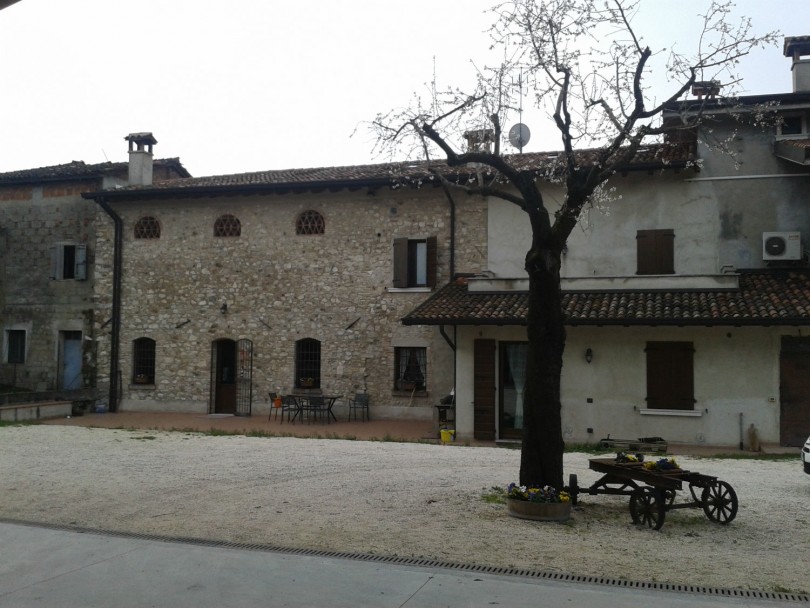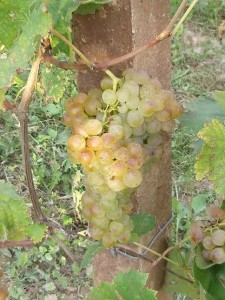Sirmione hides a sort of “rural soul” that few know: you jut have to move a few meters from the most beaten tracks to find yourself in a country area where life moves to the rhythms of the past, and where the glamorous atmosphere of one of the most famous tourist capitals of Lake Garda appear at least remote. It ‘a bit the feeling you get coming to Cascina Albarone, headquarter of the Emilio Pasetto winery, acquired in 1977 by a family from Soave whi finally landed on Garda to bet on the future fortunes of Lugana.
“My father has certainly done a great deal, especially because he has created a future for his sons – tells Stefano Pasetto, which together with brother Marco now takes care of the farm bought by father Emilio 40 years ago-. Of course, originally here the vineyard was not yet dominant and the farm was also producing corn and other things, but we soon realized that the future was in the wine. Initially we were only grape producers, but in 1993 we made our winery, debuting on the market a year later with a first quantity of 3,000 bottles “.
Today Pasetto is a reality of 13 hectares of vineyard grouped around the central farm (four more ar run no more than 500 meters as the crow flies)=: the production in time rose to 110,000 bottles, favored in this growth by the irresistible expansion trend of the famous Garda white wine.
“We belong a bit to the 90ies generation of Lugana producers – says Stefano-. On the market today there are many new realities, but we have experienced first hand the progressive success of this wine, with the boom exploding about 10-15 years ago. ” Lugana represents 80% of the Pasetto production, with only two labels: a more classic Lugana Cascina Albarone, and a selection called Lugana “I Calmi”.
A label that stands out from the range is also the Albarone Rosato, a rosé produced by Merlot and Barbera i equal parts: a really nice one, where acidity and structure conspire for a product surely able to give satisfaction to the fans of the genre. There are also two red wines: a Marzemino IGT Benaco Bresciano, and Albarone Rosso, almost a 85% Merlot with a small percentage of Cabernet Sauvignon.
“We export about 20% of our production, mainly in Germany, in 2015 for first time we landed in Denmark and the United States, but we are mainly rooted in the area, with direct sales in the cellar that takes away about 30% of production – explains Stefano -. Ours is a family-run business: we do everything ourselves from the field from the bottle, but we are very satisfied. I believe that the great interest in Lugana is expected to grow again because those who approach this wine will not forget it anymore: with its minerality is salinity it is able to conquer everybody. ” Albarone farm is open every day from 9 to 12 and from 2.30 to 6.30 pm: it is possibile to go there on Sundays, but only after telephone notice or by appointment.
The Bottle
We already mentioned the very interesting character of the Albarone Rosé: but no doubt the most important Pasetto label is the Lugana I Calmi, certainly an example of how this wine has grown over the years and today is able to express various flagship labels.
I Calmi comes from the oldest vineyard, the one that already existed when Emilio Pasetto bought the company in 1970: at the beginning of the harvest it is subjected to a thinning with the elimination of the less suitable grapes. And about three weeks later, as the rest of the production is already in the cellar, they proceed to gather the last grapes of this plot. Fermentation is in steel, except for a very small percentage of 5% that ferments in barriques. It is bottled in March and sold already in the year, while lending itself to much more long aging as indeed characteristic of this wine. The result is a Lugana rather sober to the nose, which in the glass reveals a direct byt profound nature, combining structure and flavor with harmony.



Leave a Comment